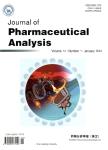Plasma-metabolite-based machine learning is a promising diagnostic approach for esophageal squamous cell carcinoma investigation
Plasma-metabolite-based machine learning is a promising diagnostic approach for esophageal squamous cell carcinoma investigation作者机构:Laboratory of Pharmaceutical Analysis and Drug MetabolismCollege of Pharmaceutical SciencesZhejiang UniversityHangzhou310058China The Cancer Research InstituteThe Cancer Hospital of the University of Chinese Academy of Sciences(Zhejiang Cancer Hospital)Institute of Basic Medicine and Cancer(IBMC)Chinese Academy of SciencesHangzhou310022China
出 版 物:《Journal of Pharmaceutical Analysis》 (药物分析学报(英文版))
年 卷 期:2021年第11卷第4期
页 面:505-514页
核心收录:
学科分类:0710[理学-生物学] 1007[医学-药学(可授医学、理学学位)] 1002[医学-临床医学] 0817[工学-化学工程与技术] 100214[医学-肿瘤学] 0703[理学-化学] 10[医学] 0702[理学-物理学]
基 金:supported by the National Natural Science Foundation of China(Grant Nos.81672315,81802276,and 81302840) Key R&D Program Projects in Zhejiang Province(Grant No.2018C04009) 1022 Talent Training Program of Zhejiang Cancer Hospital。
主 题:Diagnostic Esophageal squamous cell carcinoma(ESCC) Metabolomics Machine learning Prognostic
摘 要:The aim of this study was to develop a diagnostic strategy for esophageal squamous cell carcinoma(ESCC)that combines plasma metabolomics with machine learning algorithms.Plasma-based untargeted metabolomics analysis was performed with samples derived from 88 ESCC patients and 52 healthy controls.The dataset was split into a training set and a test set.After identification of differential metabolites in training set,single-metabolite-based receiver operating characteristic(ROC)curves and multiple-metabolite-based machine learning models were used to distinguish between ESCC patients and healthy controls.Kaplan-Meier survival analysis and Cox proportional hazards regression analysis were performed to investigate the prognostic significance of the plasma metabolites.Finally,twelve differential plasma metabolites(six up-regulated and six down-regulated)were annotated.The predictive performance of the six most prevalent diagnostic metabolites through the diagnostic models in the test set were as follows:arachidonic acid(accuracy:0.887),sebacic acid(accuracy:0.867),indoxyl sulfate(accuracy:0.850),phosphatidylcholine(PC)(14:0/0:0)(accuracy:0.825),deoxycholic acid(accuracy:0.773),and trimethylamine N-oxide(accuracy:0.653).The prediction accuracies of the machine learning models in the test set were partial least-square(accuracy:0.947),random forest(accuracy:0.947),gradient boosting machine(accuracy:0.960),and support vector machine(accuracy:0.980).Additionally,survival analysis demonstrated that acetoacetic acid was an unfavorable prognostic factor(hazard ratio(HR):1.752),while PC(14:0/0:0)(HR:0.577)was a favorable prognostic factor for ESCC.This study devised an innovative strategy for ESCC diagnosis by combining plasma metabolomics with machine learning algorithms and revealed its potential to become a novel screening test for ESCC.



